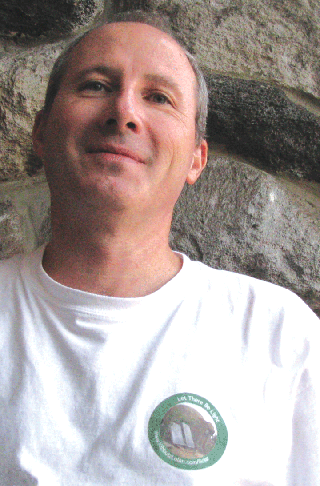By MORDECAI SPECKTOR
Everyone can do something to conserve energy resources, according to Alex Cicelsky, a founder of Kibbutz Lotan in Israel’s Arava Desert.
You can carpool to reduce “miles per gallon per person,” he suggests. You can insulate your house by adding plastic film over windows, or cover them at night with insulating drapes.
The Center for Creative Ecology, a Jewish environmental education institute at Lotan, has taken energy conservation to another level, constructing houses out of straw bales to provide super-insulation in the torrid desert climate. The 150 kibbutz residents raise organic vegetables, use state-of-the-art composting toilets and convert the sun’s energy into electricity, as part of their efforts to create an ecologically sustainable community.
And conserving the natural environment is rooted in the Jewish sources, Cicelsky pointed out during a recent visit to the Jewish World offices. During his visit to Minnesota, Cicelsky also spoke at Bet Shalom Congregation and Temple Israel in Duluth.
He quotes Genesis (2:15): “God placed Adam [and Eve] in the Garden of Eden to till and to tend.”
And in the “Shema” prayer, Jews proclaim that “God is one,” which to Cicelsky connotes that “this is all one network” — physical oneness and spiritual oneness is “what Judaism has been teaching us for thousands of years.”

Cicelsky made aliya in 1982, and the following year was part of the group of Kibbutz Lotan founders, many of whom came out of the Reform youth movement. There are 56 members, with 62 children, on the kibbutz. The collectivist enterprise has a gross income of around $2.5 million per year, from sales of dates and dairy products, income earned in off-kibbutz pursuits, and eco-tourism.
It is a kibbutz rooted in egalitarian liberal Judaism, explains the Cornell University graduate who majored in soil science. Explaining what “egalitarian” really means, Cicelsky says, “Women need to be in charge, not men”; the kibbutz is run by women.
Lotan has a kosher dining hall, which enables everyone, regardless of his or her level of observance, to eat together. Shabbat and Jewish holidays are observed in what Cicelsky describes as a practice of “creative Judaism.”
Teenagers prefer tending and milking the goats, as part of the one day per week each teen works on behalf of the kibbutz, notes Cicelsky, who adds that Lotan does not have a children’s house, which was a feature of many kibbutzim in past years.
Apart from the permanent residents on the kibbutz, visitors can participate in Lotan’s Center for Creative Ecology courses:
• The Green Apprenticeship core program is a seven-week course in practical environmentalism. It covers food production, permaculture, ecological design techniques, sustainable technologies (composting toilets, gray and black water purification system, solar ovens, etc.) and environmental ethics.
With the apprenticeship model, participants grow vegetables; build structures with mud, straw bales, tires and trash; compost food scraps with the help of worms (vermiculture); and help maintain the EcoCampus neighborhood on the kibbutz.
• A fall semester course, “Peace, Justice and the Environment,” is accredited through the University of Massachusetts, Amherst. Fourteen students come to Lotan and learn about social justice, group dynamics, and sustainable agriculture and design.
• Reform congregational and youth groups can learn about Jewish community and practical environmentalism.
Also, tourists looking for something different can check out Kibbutz Lotan, which is mentioned on the back cover of the Lonely Planet Guide: Israel and the Palestinian Territories. Cicelsky suggests that visitors should consider a south-to-north tour of Israel, beginning in Eilat, moving through the Arava and then up to Jerusalem and points north.
And Cicelsky swears by the relaxing and rejuvenating effects of Lotan’s “watsu,” a water shiatsu massage pool, which is filled with salty water at body temperature. There is also the Lotan Nature and Migratory Bird Reserve. The Arava region is a flyway for myriad species of birds, and Lotan has a “bird hide,” a classroom and observatory for watching and cataloguing our winged friends.
And “right downtown on the kibbutz,” visitors can see the wetland wastewater treatment system, a “constructed wetland,” which filters wastewater for reuse. Both the Jewish National Fund and the European Union are funders of the wetland project and a future bird park.
Kibbutz Lotan was awarded the 2006 award for Ecovillage Excellence by the Global Ecovillage Network. And earlier this year, the Center for Creative Ecology was a runner-up in JTA’s first Greenie Beanie Awards competition, which recognizes outstanding environmental activities in the Jewish community.
Cicelsky and his fellow kibbutzniks are truly among Israel’s ecological pioneers; but one wonders how much of a difference a few composting toilets and super-insulated homes can make in view of the impending cataclysm posed by global climate change.
I didn’t pose that question to Cicelsky; but Kibbutz Lotan was the cover story in the recent issue of Reform magazine, and their interviewer did suggest that what they are doing is merely a “drop in the bucket,” fairly insignificant.
Again, Cicelsky draws on the Jewish sources in his answer: “From a permaculture perspective, we each need to take one step at a time with no preconditions as to the final outcome. From a Jewish perspective, Rabbi Tarfon addressed the concern regarding confronting a seemingly insurmountable challenge when he said: ‘It’s not up to you to complete the task, but neither are you free to desist from it.’”
***
For information on the Center for Creative Ecology at Kibbutz Lotan, go to: kibbutzlotan.com.




















Comments 0